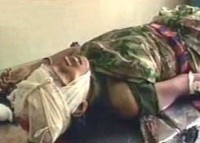Editorial wisdom on Nandigram

You don¿t say!
Darius Nakhoonwala
As edits go Nandigram was a sitting duck. Everyone took a shot at it and everyone missed the point, deliberately or otherwise. My view is this: Nandigram is a reflection of an inner party struggle for supremacy between Prakash Karat and the more mature leaders. I read through dozens of edits and found not one that had the gumption of insight to say it.
Instead, much of it was the usual noise about the CPM, the state government, Mamata Bannerji and so on. But barring the Hindu which defended both the actions and non-action of the state government, others at least had their wits about them sufficiently to make strong clucking noises.
The Telegraph safely took on the police. "The police stood by and did nothing while the cadre of the Communist Party of India (Marxist) wreaked destruction and mayhem in Nandigram… but… in
The Hindu called these goings-on a challenge, but for the state government. It took the Karat line and blamed Maoists for the violence because, after all, CPM cadres are such lambs. "The forced withdrawal of the police from certain areas provided a new opportunity for the Maoists to set up an armed presence in the region… and continue their campaign of violence and externment, and of preventing the administration from functioning." Wow! Really?
The state government, poor thing, even though the chief minister is also the minister for the police, just watched helplessly, it seems. "The Central government, which depends on the Left for survival, has eventually responded to the request by the Government of West Bengal by releasing a battalion of the Central Reserve Police Force for deployment in the Nandigram region." But the edit did not mention that the state government would not let them in till the CPM cadres had gone in first.
The Indian Express, of course, went off the other end, and as its wont, wrote two edits. One was low political science, and the other was low sociology, if you like. "What we have been seeing… are two ways of political mobilisation, both of them incongruous in a liberal democracy. On the one side is a political party like the CPM, whose genteel higher leadership has been exposed by the spectacle of its cadres using rough methods and the administrative cover of the state government to hold its turf. On the other is an array of adversaries — political parties like the Trinamool, anti-state actors like the Naxals, and all manner of anti-development activists. They are not competing at Nandigram with an alternative agenda. They are there for opposition¿s sake. Anarchy is the only option they offer."
The sociology bit came the next day. "The political battle over Nandigram has also unleashed an irony. Ranged against the CPM-led Left Front government in
The Asian Age edit stuck the facts and avoided pointless interpretation. "The… chief minister sought to address it as a mere law and order problem, and did not care to seek a political solution. And then the ruling party unleashed the brute force of its armed red brigade on Nandigram to recapture lost ground. This was mainly because the government failed in its Constitutional duty to uphold the rule of law and ensure the return of the homeless CPI(M) supporters living in makeshift camps since March 14." That, in a nutshell was it.
The Pioneer mouthed some abuse and blamed the central government where the BJP has to focus. " The UPA Government could have prevented much of the latest spate of violence if it had rushed paramilitary forces that had been sought by Chief Minister Buddhadeb Bhattacharjee, who stands isolated in a party of thugs. Instead, the Government, terrified of upsetting the CPI(M), especially its top leaders who have been advocating a brutal suppression of popular resistance in Nandigram without betraying the faintest concern for the law of the land, chose to drag its feet, thus letting Mr Prakash Karat know of its true loyalties and pandering to Mr Jyoti Basu and his ilk who have the temerity to suggest that it has been a "peaceful takeover" at Nandigram."
It also took a swipe at the intelligentsia. "Contrast this with their vociferous denunciation of the Gujarat Government and you will get a clear picture of the perversity that has replaced intellectual integrity in our country. If the CPI(M) is to blame for the criminal misdeeds of its cadre at Nandigram, then the Congress, which controls the Union Home Ministry, is guilty of facilitating the mass murder, rape and arson we have been witnessing since October 27."
The Times of India did, however, point to a very relevant fact. " For the first time since the Left Front won office in the state, a substantial section of the ¿Left constituency¿ has revolted against the CPM." It also made another important point. "It is a war, an almost primitive one at that, to capture territory. This fight resembles a blood feud, not a political struggle."






